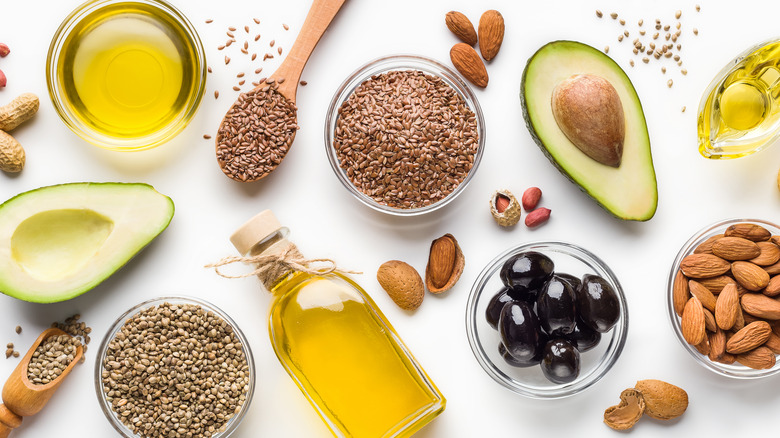You're Not Eating Enough Fat If This Happens To You
Due to various marketing campaigns over the years, fat has developed a bad reputation. You can still find plenty of low-fat products around grocery stores that claim to be healthier for you than full-fat alternatives. Contrary to popular belief, fat is essential for a healthy diet. According to Healthline, dietary fat plays many essential roles in your body. It helps you absorb fat-soluble vitamins like vitamins A, D, E, and K, which can only be absorbed when you eat them with fat. Fat also supports cell growth, improves brain and eye health, plays a role in wound healing, and provides a substantial amount of energy.
There are four types of dietary fats: trans fats, saturated fats, monounsaturated fats, and polyunsaturated fats. Trans fats are mainly found in processed foods and are not necessary for our bodies. It is recommended that you limit trans fats in your diet as much as possible. However, saturated fats, monounsaturated fats, and polyunsaturated fats are all crucial for a healthy diet. Most of the fats you eat should be monounsaturated and polyunsaturated, which can be found in foods like nuts, seeds, avocados, and fatty fish.
Symptoms of a fat deficiency
Because fat is essential for a healthy diet, not eating enough fat can cause numerous problems for our bodies. According to Eating Well, one of the surest ways you aren't getting enough of this nutrient in your diet is that you're always hungry. Fat is broken down in the body more slowly than protein or carbs and should keep you full for a long time. If you find yourself hungry again shortly after eating, try adding more fat to your meals. Similarly, you may not be eating enough fat if you're always tired. Fat contains more calories per gram than protein and carbs, which can then be used as energy. Limiting fat in your diet will likely limit the amount of energy you have.
Other signs that you're not eating enough fat include achy joints, dry skin, poor immune health, and difficulty concentrating. Adults should aim for about 60 grams of fat per day unless directed otherwise by a doctor. People who are very active or in a larger body will need more than that amount. Talk to your doctor if you are concerned about the amount of fat that you're eating.


